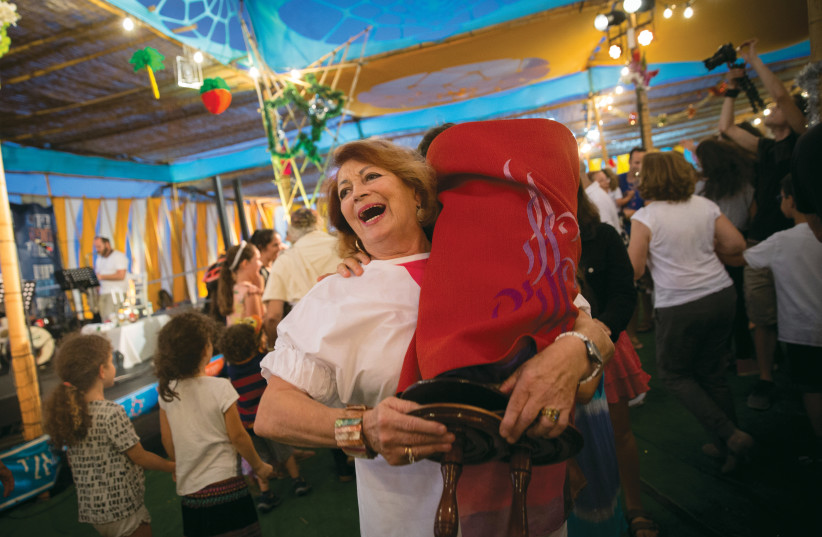Simchat Torah, the joyous holiday marking the completion of the annual Torah reading cycle, has long been a celebration of great significance within the Jewish community. It is a time when congregations come together to express their love and reverence for the Torah, the sacred scroll containing the foundation of Jewish law and tradition. It’s also a time for a good party and a few drinks.
For many years, this celebration was dominated by men, leaving women relegated to distant onlookers, peering through the mechitzah (partition) at the menfolk having a great time on the other side. In recent times, however, there has been a notable shift, even in the Orthodox world, towards greater inclusivity in the participation of women in Simchat Torah celebrations. This change represents a significant step forward in the quest to enable women to be more involved in Orthodox Judaism, while still respecting the rich traditions of the past.
Traditionally, Simchat Torah was a male-centric event, with men receiving the honor of being called up to the Torah, dancing with the Torah scrolls, and leading the celebration. Women, on the other hand, were often confined to the periphery, watching the festivities unfold. This gendered division of roles reflected a historical imbalance within Jewish religious practice, wherein men had greater access to religious rituals and leadership roles while women were often excluded or marginalized.
The changing way the holiday is celebrated
But things are beginning to change in the way Simchat Torah is celebrated in many congregations. A significant development is the inclusion of women in the ritual of dancing with the Torah. In some places, women get their own Torah scrolls to dance with, bridging the gap between genders in this joyous celebration. This symbolic act underscores the idea that women are equal partners in their connection to the Torah and the divine wisdom it imparts.
Another noteworthy development is the emergence of women’s readings of the Torah that adhere to Halacha (Jewish law). These provide women with the opportunity to participate actively in the Torah-reading process, while staying within the boundaries of Orthodox tradition. This innovation represents a harmonious balance between tradition and modernity, enabling women to engage with the Torah’s teachings in a meaningful way.

Some communities have even gone a step further by introducing Kallat Torah (Torah bride) and Kallat Bereishit (Genesis bride) which mirror the traditional Chatan Torah (Torah groom) and Chatan Bereishit (Genesis groom) who are honored on Simchat Torah. This shift acknowledges the important role that women play in preserving and transmitting Jewish tradition, and it recognizes their unique connection to the Torah.
The inclusion of women in Simchat Torah celebrations represents a powerful step forward in fostering a more inclusive and equitable environment within Orthodox Judaism. It signifies a growing recognition that women have the right to participate in certain religious rituals and express their spirituality within the framework of Jewish tradition.
HOWEVER, IT is essential to strike a delicate balance between promoting gender equality and respecting the sacredness of Jewish tradition. It would be a grave mistake to use Judaism and the Torah merely as tools in the feminist battle for equality without genuine spiritual intent. Judaism’s rich traditions should not be exploited for political gain. Simchat Torah should be an expression of deep spiritual connection, not merely a sop towards equality.
It is vital to recognize that not all women necessarily desire, or feel comfortable with, an expanded role in Simchat Torah or other religious practices. Some women may be content to watch from the sidelines, appreciating the traditions of their mothers, finding uplifting meaning in their time-honored observance of Judaism in a feminine way. It is crucial not to make women feel inadequate if they choose to maintain traditional roles. The beauty of Judaism lies in its diversity and the ability to embrace multiple paths to spiritual fulfillment.
In recent years, opportunities for women in Orthodox Judaism have expanded significantly in a number of areas.
Women are increasingly involved in a wide variety of learning and teaching programs, and they have assumed positions of influence and leadership within the community, both lay and religious.
The evolution of Simchat Torah celebrations serves as a barometer of this progress, reflecting a more inclusive and egalitarian approach within Orthodoxy.
Nonetheless, it is essential to proceed with caution. While change is necessary and positive, it must be guided by a genuine desire to enhance the religious experience and deepen one’s connection to Judaism, rather than being driven solely by the pursuit of gender equality. Judaism’s traditions are deeply precious and must not be discarded lightly or compromised for the sake of political gains.
One could postulate that the evolving celebration of Simchat Torah, with its increasing inclusivity for women, is indeed a “dance step in the right direction.” It represents a move towards greater gender equality within Orthodox Judaism while respecting the traditions that have sustained Jewish communities for generations. However, as we embrace these changes, we must do so with a deep sense of reverence for the Torah and the religion it represents.
Simchat Torah should be a celebration of unity, spirituality, and the enduring strength of Jewish tradition, for both men and women.
The writer, a rabbi, lives in Ramat Poleg, Netanya, and is a co-founder of Techelet – Inspiring Judaism.
